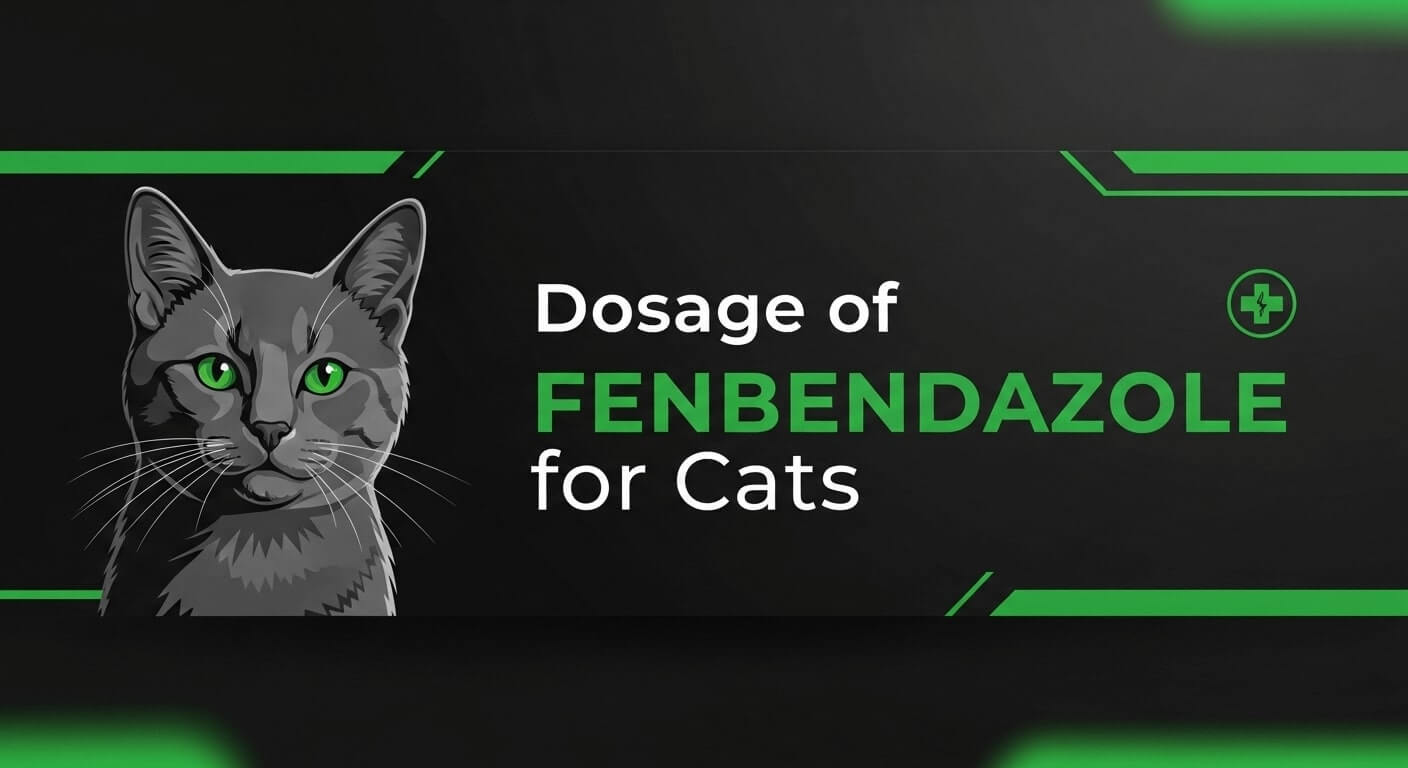
Fenbendazole is a widely used anthelmintic (dewormer) medication effective against various intestinal parasites in cats. If your feline friend is suffering from worms, understanding the correct dosage of fenbendazole for cats is crucial for safe and effective treatment.
In this detailed guide, we’ll cover everything you need to know about fenbendazole, including its uses, recommended dosages, safety precautions, and potential side effects.
What Is Fenbendazole?
Fenbendazole is a benzimidazole-class dewormer that works by disrupting the energy metabolism of parasites, leading to their death. It is commonly used to treat:
- Roundworms (Toxocara cati, Toxascaris leonina)
- Hookworms (Ancylostoma tubaeforme)
- Tapeworms (Taenia taeniaeformis)
- Giardia (off-label use)
- Lungworms (Aelurostrongylus abstrusus)
While fenbendazole is FDA-approved for dogs (under brand names like Panacur®), it is often used off-label for cats.
Recommended Dosage of Fenbendazole for Cats
The standard dosage of fenbendazole for cats is 50 mg/kg (22.7 mg/lb) of body weight, administered orally once daily for 3 to 5 consecutive days. However, the exact dosage and duration may vary depending on the type of parasite being treated.
Dosage Guidelines for Specific Parasites
- Roundworms & Hookworms
- Dosage: 50 mg/kg once daily for 3 days
- Example: A 10 lb (4.5 kg) cat would need ~225 mg per day.
- Tapeworms
- Dosage: 50 mg/kg once daily for 5 days
- Note: Praziquantel is more effective for tapeworms, but fenbendazole can be used in some cases.
- Giardia
- Dosage: 50 mg/kg once daily for 5 days
- Often combined with metronidazole for better efficacy.
- Lungworms
- Dosage: 50 mg/kg once daily for 10-14 days
Always consult your veterinarian before administering fenbendazole to ensure the correct dosage of fenbendazole for cats based on your pet’s weight and health status.
How to Administer Fenbendazole to Cats
Fenbendazole is available in several forms:
- Granules/Paste (Panacur®) – Can be mixed with food
- Liquid Suspension – Easier to dose for small cats
- Tablets – Crushed and mixed with food if needed
Tips for Giving Fenbendazole to Cats
- Mix the medication with a strong-smelling wet food to mask the taste.
- Use a pet piller or syringe for liquid forms.
- Ensure the full course is completed to prevent parasite resistance.
Safety & Side Effects of Fenbendazole in Cats
Fenbendazole is generally safe when used at the correct dosage of fenbendazole for cats, but some side effects may occur:
- Mild gastrointestinal upset (vomiting, diarrhea, loss of appetite)
- Lethargy (rare)
- Allergic reactions (very rare)
Contraindications & Precautions
- Pregnant cats: Fenbendazole is considered safe but consult a vet first.
- Kittens: Safe for kittens over 6 weeks old at the proper dosage.
- Liver/kidney disease: Use with caution in cats with pre-existing conditions.
Frequently Asked Questions (FAQs)
1. Can I Use Dog Fenbendazole for My Cat?
Yes, but ensure the dosage of fenbendazole for cats is correctly calculated based on weight. Dog formulations may have different concentrations.
2. How Long Does Fenbendazole Take to Work?
Most worms begin dying within 24-48 hours, but full elimination may take a few days.
3. Can Fenbendazole Be Used Preventatively?
It is not typically used as a regular preventative but can be given periodically in high-risk environments (e.g., multi-cat households).
4. What If My Cat Vomits After Taking Fenbendazole?
If vomiting occurs within an hour of dosing, redose. If it persists, consult your vet.
Natural Alternatives to Fenbendazole
If you prefer a more holistic approach, some natural dewormers include:
- Pumpkin seeds (contain cucurbitacin, a natural dewormer)
- Diatomaceous earth (food-grade)
- Herbal blends (e.g., wormwood, cloves)
However, these are less reliable than fenbendazole for severe infestations.
When to See a Veterinarian
While fenbendazole is effective, consult a vet if:
- Your cat shows severe side effects.
- Worms persist after treatment.
- Your cat is very young, old, or has health issues.
Final Thoughts on Fenbendazole for Cats
Understanding the correct dosage of fenbendazole for cats is essential for safely eliminating intestinal parasites. Always follow veterinary advice and complete the full treatment course to ensure effectiveness.
By using fenbendazole responsibly, you can help keep your feline companion healthy and worm-free!


Beverlee Hilton
October 31, 20253 vets say my cat has cancer on her back leg. very large tumor. i want to use fenbendazole to treat, but vets won’t help me. what can i do, they want to amputate, all 3 vets i’ve gone to